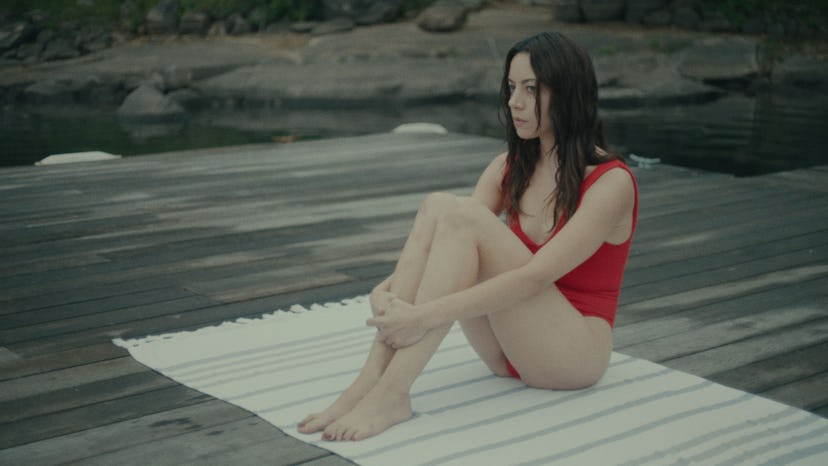Aubrey Plaza Takes On Her Most Layered, Dramatic Role Yet
The actress reflects on her work as an engimatic filmmaker in the indie film 'Black Bear,' a role written specifically for her by Lawrence Michael Levine.

Last week, Hulu dropped the romantic comedy Happiest Season, the first studio-released Christmas movie centering on a lesbian couple (portrayed by Kristen Stewart and Mackenzie Davis). While the film—spoiler alert!—ends, unsurprisingly, with the pair blissfully united and in love, much of the post-release conversation, at least on social media, has focused on an alluring supporting character, Riley, played by Aubrey Plaza. Plaza imbues Riley—the spurned ex-flame of Davis’s character—with a wry and captivating worldliness, to the point that her on-screen sparks with Stewart led many to express frustrations afterwards that their characters weren’t the ones that ended up together.
For Plaza, this sort of show-stealing in a supporting role is not unusual. In her first high-profile gig, on NBC’s Parks and Recreation, her deadpan April Ludgate became one of the most adored characters on a show chock full of contenders. Whenever she appears in a movie or series, no matter how much screen time she has, you’re left wishing you had seen more of her. And while she has taken on larger roles before (Safety Not Guaranteed, Ingrid Goes West), her turn in the indie film Black Bear—out in theaters and on digital platforms this Friday—is arguably her most layered and dramatic leading role yet, and it has earned her the best reviews of her career.
If it feels, watching her in Black Bear, that this is the role you didn’t realize you had long been waiting to see Aubrey Plaza really sink her teeth into, well, that was somewhat by design. The part was written expressly for her by Lawrence Michael Levine, whom Plaza initially met “in a hot tub at a party a long, long time ago,” she recalls, speaking on the phone this month. The two reunited when they played a married couple on an episode of Netflix’s Easy: they bonded over the fact that both were in relationships with filmmakers, and discussed at length “how messy that can get.”
That messiness related to dating a filmmaker is a central theme of Black Bear, which Levine both wrote and directed. He presented the script to Plaza about a year after their reunion on Easy; Plaza says that, upon reading the script, she was “blown away by the writing” but, at the same time, the “material was so scary” to her. She remembers wondering how Levine could have believed she’d be able to pull off the character, an enigmatic filmmaker-actress named Allison who arrives at a remote cabin for a retreat, a marked departure—in her journey over the course of the film—from the sardonic, eye-rolling characters we’re used to seeing Plaza play.
Courtesy of Momentum Pictures.
Courtesy of Momentum Pictures.
The shoot, which almost entirely took place at the cabin, was grueling, and Plaza describes it as one might an arduous backpacking trip. “It was hard,” she reflects. “We were up against the elements. We were shooting in a location that was off the grid. We had no cell service. We were having total blackouts every hour or so. We were losing our fucking minds.” There is an underlying mania that comes through in the film—which also stars Christopher Abbott and Sarah Gadon—that suits Plaza’s skill set well. She manages to ground the film with a bracing authenticity while still unnerving the audience slightly. “There was a lot of drama [on set],” she says. “And I think the lines between reality and the film world were very blurred for me at times in a way that I had never experienced before. But I think that was kind of what I was signing up for.”
Plaza has been involved in a few projects over the pandemic period—a Parks and Recreation reunion, and Sarah Cooper’s Netflix special—and says while she has found herself creatively stimulated, she has really missed acting, coming to a new realization about “how much acting is such an outlet” for her. (She jokes that she was so excited for her one day on set for the Cooper special that she treated it “like it was my Meryl Streep Oscar moment.”) She has also finished a feature screenplay that she had been working on for several years, a script she thinks will surprise people, explaining, “It is a comedy, but it’s a family comedy, kind of like a Tim Burton-style creepy comedy, but not as dark and cutting as maybe people would expect.” She says she’ll direct and act in the film, as well—“men have been doing it for years”—and that her dream is to “become the next Penny Marshall.” (Her first directing project will be seen on television soon, as she wrote and directed an episode of a not-yet-announced project for Showtime.)
The way Plaza reflects on her Black Bear experience, though, it is clear that this passion project has set the standard for what she hopes to capture in her films moving forward. She discusses one pivotal scene in particular, in which Allison collapses after a breakdown and is helped up by Abbott’s character, during which Plaza says she came to a realization: “I fell on the ground and Chris is holding me…There was a moment there when he carries me outside after that, and we were just looking at each other like, ‘This is real.’ There was something about that moment to me—I’ve never experienced that before. It felt like everything that I’ve wanted to experience. I don’t know if I’ll ever feel that again.”
Related: Happiest Season: The Trailer for Kristen Stewart’s Big, Gay Christmas Film Is Here